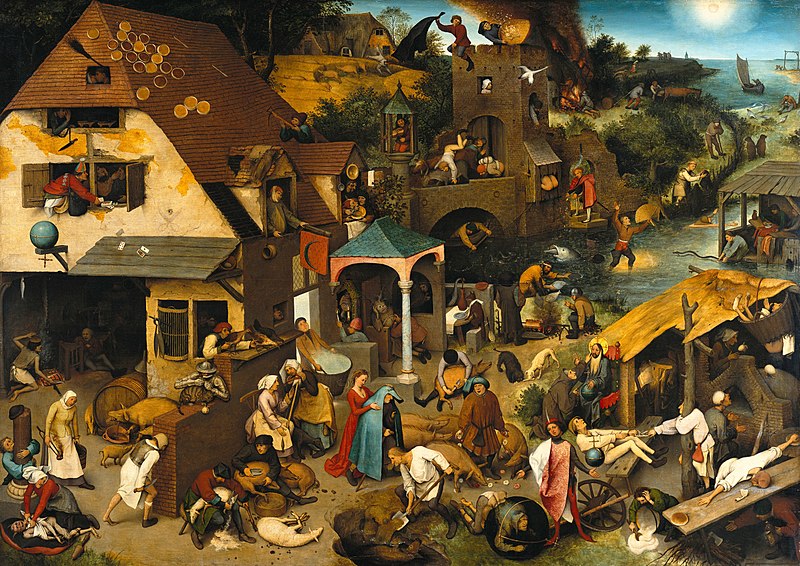|
Adagia for the End of Our World Proverbs are a treasure house or live within a lake held in common property. We fish for them like trout and recipients nod and reckon they have heard this one before. If I were to tell my ancestors about our heat, they would detect a tall tale, I would hear them hiss: go fish. Erasmus thought proverbs were gemstones we set, and deemed it garish to use too many. He used the following metaphor: a painter projects figures in a painting so that the shadows do not overlap with other figures. But take Bruegel, and his Netherlandish Proverbs. He fit 119 in his. Here, already: our house is on fire. Yet, what can smoke do to iron? It takes a level of picturacy to work one’s way through this painting. And there are so many proverbs here we can no longer read: taxidermy of lost tongues, frozen in oils, crimson, earth, azure. Memento mori. Proverbs are as weak as life. Consider the frailty of the crocodile always shedding so many tears in vain. Dropping tears worth nothing. There are tears that are worth something, like pearls. There are things of capital importance. Sit tibi Terra levis. Netherlandish always sounded like Outlandish to me, which is how I think of the Earth. In Bruegel’s Netherlandish Proverbs: Some catch fish without a net. One shears sheep; the other, pigs, but mostly, albeit the proverb’s predilection for housing animals within its walls, I see humans, almost a hundred, densely populating a house, a yard or inlet, densely pressing one against the other, teeming. Foregrounded. Anthropocene. The world turned upside down. A man yells to the heavens for mercy. Another is armed to the teeth: expecting the unexpected, in shining armor, blade between two lips. Proverbs shelter our faith in murmurs. They exceed time: in them, things happen aren’t happening, unlike in Bruegel’s painting where simultaneous scenes are happening and overlap, for a second. I blink. This is the way of the world: Big fish eat. Small fish never had a chance. Stones can duplicate in mid-flight to kill two birds, whose fall in mid-air is only like a book falling defoliating itself in wounds. Finders, seekers. What killed the cat? She was a hard-working cat, came home on Sundays. Fed her children, a cluster of grapes but tarter, with lactic acid. What killed her? We need to know, we need answers. Wisdom is wisdom is wisdom. Intertextuality is a form of expropriation. Expropriation is God kicking Adam out of heaven. The original sin all along was being an owner of property. All roses are not not roses. Not all that glitters is mine. A mine a day keeps the miners away-- or dead, or both, like parrots underground, faint, feathered. Alea iacta est. Proverbially. Better late than-- Today: Oil is thicker than water. Marbled film of fuchsia and patent jet. So don’t cry cat tears the day of weakened bonds. Don’t cast pearl drops before the swine, not over spilt oil, plastic, milk. Better to business as usual. Consider Bruegel’s crane starting its migration, right next to our house on fire, leaving towards another land, more temperate, her white span feathering, untarnished, gleaming in sun spill and maybe returning and returning here never pausing her flight waiting only for us, the blind leading the blinded, to give her a signal to Land. María Gómez de León María Gómez de León is a Mexican writer, based in Mexico City, where she studied English Literature at UNAM. She is currently assembling her first collection of poetry, nestled in a 215-square-feet apartment in Colonia del Valle, at times longing to be outside, where jacaranda and colorín flowers stipple the sidewalks in scarlet and lilac; at times, outside.
0 Comments
Your comment will be posted after it is approved.
Leave a Reply. |
The Ekphrastic Review
COOKIES/PRIVACY
This site uses cookies to deliver your best navigation experience this time and next. Continuing here means you consent to cookies. Thank you. Join us on Facebook:
July 2024
|




